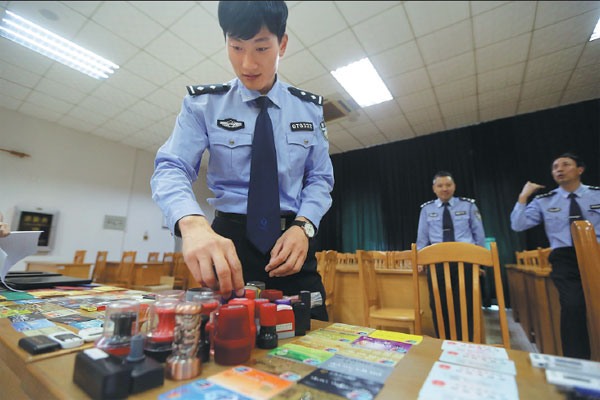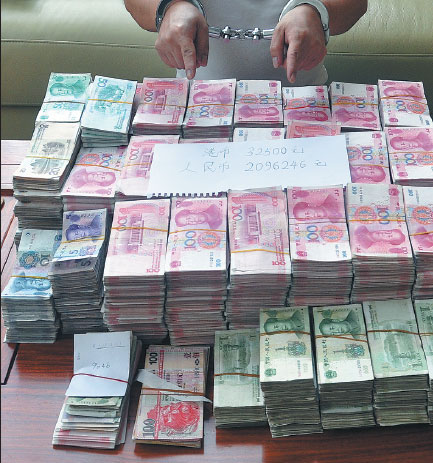|

A police officer checks bank cards and plastic stamps confiscated during a crackdown on underground banks in Shenzhen, Guangdong province, in November. She You / For China Daily
|
The nation's financial authorities are tackling money laundering by improving the mechanisms used to track suspect flows of funds. Wang Yanfei reports.
Yan Feng (not his real name) used to operate a small store that sold liquor and snacks on a street near the ferry port in Shenzhen, Guangdong province.
Although the store appeared no different to any other outlet in the business-dominated city, which stands adjacent to Hong Kong and was the site of China's first Special Economic Zone, close acquaintances knew the family used the premises as a front for a well-developed underground bank.
For a year, Yan and his family helped clients to move amounts far in excess of the annual $50,000 foreign currency limit to regions outside the mainland, including Hong Kong and Macao, which have no currency restrictions.
Acting on Yan's instructions, clients transferred money to bank accounts under his control. Once the deposit had been made, Yan's accomplices in Hong Kong placed an equivalent amount in a local bank using Hong Kong dollars. The client was then able to transfer the money to an account of their choice anywhere in the world, but to all intents and purposes no irregular transaction had taken place.
Yan was just one of many "black bankers" in China's coastal regions who offer quick fund-transfer services and move hundreds of millions of dollars out of the country every day. Although no official figures are available, unconfirmed estimates claim about $10 billion is laundered through China every year, mostly via outbound transactions.
Growing concerns
As key components in the money laundering sphere, the activities of underground banks have become a growing concern for China's financial institutions in recent years, and their success has raised questions about the lack of regulations to combat the practice.
"Foreign complaints about Chinese money laundering are not new, but some complainants have exaggerated the situation," said Jin Luo, director-general of the anti-money laundering bureau at the People's Bank of China, the nation's central bank.
|

More than 2 million yuan earned via money laundering was handed over to police by a suspect at an underground bank in Guangzhou, Guangdong, in April last year. Xinhua
|
Rather than being a haven for money laundering as some people believe, China does not have the fundamentals to become a hub for illegal activities, according to Jin.
China joined the Financial Action Task Force - an intergovernmental agency founded in 1989 to fight money laundering and other illegal financial activities - in 2007.
"Since then, China has been striving to meet the rising expectations of the international community," she said, adding that one significant move was the improvement of systems to track suspect capital flows through financial institutions.
Although Yan Feng and his partners dispersed their transactions across a number of banks to avoid suspicion, the Shenzhen branch of Bank of China, a commercial lender, used a new system designed to tackle money laundering and traced 183 accounts opened by the family for use in illegal foreign-exchange transactions.
Yan and his partners are now awaiting trial on money laundering charges.
"The improved systems allow local branches at the municipal level to better play their roles in the fight against money laundering," Jin, of the PBOC, said.
Last year, China launched a nationwide probe to tackle the problem, and the PBOC and other financial institutions have made combined efforts to close loopholes within the financial system to help investigators crack down on illegal activities.
Regional differences
Although banks nationwide have adopted the basic tracking systems, they have been revised by local anti-money laundering bureaus in accordance with regional differences - unlike the coastal regions, which face a greater threat of illegal cross-border transactions, the challenges facing China's underdeveloped inland regions revolve around terrorism and illegal drugs.
"Financial institutions adopt different models to detect money laundering. That's because the inland regions have seen an increased risk of money laundering related to the financing of terrorism and drug production in recent years," said Zhao Ying, deputy head of the anti-money laundering bureau at the PBOC's branch in Chengdu, the capital of Sichuan province.
For example, banks in Panzhihua, one of Sichuan's major drug trafficking routes with neighboring Yunnan province, adopt different mathematical models to identify suspected clients and transactional behavior to those used by their counterparts in the coastal regions "Without financial clues, it would take a long time to identify the major suspects in drug trafficking rings, but following the trail of money transfers helps us trace the paths along which drugs are carried," said Li Guohong, deputy head of the police station in Panzhihua.
Using the anti-money laundering system to track flows of funds, financial institutions tipped off investigators about 866 cases of suspected illegal activity in 2014, a year-on-year rise of more than 82 percent. They also provided assistance that led to 925 cases being cracked, nearly 50 percent higher than the previous year, according to the PBOC's annual anti-money laundering report, published in December.
Despite the improvements in hardware systems, experts say China desperately needs to further improve supervision of commercial banks, some of which fail to report potentially illegal activity, even after suspicions are raised.
Yan Lixin, a professor at the China Center for Anti-Money Laundering Studies at Fudan University in Shanghai, said the supervisors need to help banks strike a better balance between making profits and helping to crack down on financial criminals.
In May, the China Banking Regulatory Commission issued a guideline that requires banks to forcefully adopt the Know Your Customer Norm directive, under which banks must conduct rigorous checks into clients' backgrounds and financial status when they open accounts, and report suspect transactions to the authorities without delay.
Yan Lixin said China should improve communications with other countries because the rules that regulate money laundering vary from country to country.
Rick McDonell, former executive secretary at the Financial Action Task Force, said China's involvement in international anti-money laundering efforts has been crucial, and he called on the country to play a leading role in the fight.
"FAFT and other anti-money laundering standards really wouldn't have been implemented without China's participation," he said.
By Wang Yanfei (China Daily)
Using WeChat? Scan QR Code or Press the Fingerprint Below ↓
--- (Or ADD WeChat ID: OKOKOKOKnet)
